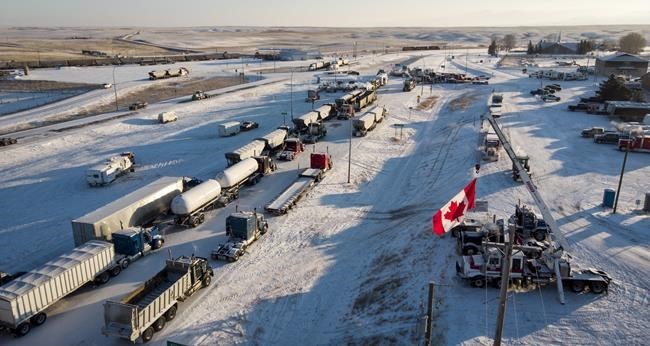MILK RIVER, ALBERTA — RCMP say a second blockade on a highway leading to the main United States border crossing in Alberta has choked off traffic.
"Protesters have stopped traffic from going southbound on Highway 4," RCMP Cpl. Curtis Peters said Thursday.
"There's a crowd there. We are advising the public to avoid the area again."
Protesters agreed Wednesday to open a lane on each side of the highway at the crossing in Coutts, Alta., where there has been a blockade since Saturday. But since then, there has been no stream of vehicles crossing the border.
The new blockade is about 18 kilometres north of Coutts and, although numbers have decreased since Wednesday night, there was still a large presence Thursday morning with semi-trailers, heavy equipment and trucks blocking access.
Vehicles flying Canadian flags and signs saying "we want freedom" moved up and down the highway north of the blockade with horns blaring.
RCMP said Wednesday night that officers would be providing escorts to anyone needing to get through the blockade.
"It kind of choked off," said Peters. "We did escort some south. I don't know how many.
"I would say it's certainly unfortunate for the people of Coutts and for those needing to cross the border."
Demonstrators began parking their trucks and other vehicles near the Coutts crossing Saturday in solidarity with similar events in Ottawa and countrywide to protest COVID-19 vaccine mandates and broader public health measures.
The impasse has stranded travellers and cross-border truckers, compromised millions of dollars in trade and impeded access to basic goods and medical services for area residents.
On Tuesday, some demonstrators left the blockade after Mounties announced that negotiations to end the standoff had failed and they were prepared to make arrests and tow vehicles.
But that move didn't sit well with some protesters, who breached a police barrier to join the blockade.
Peters said he wasn't sure if negotiations would begin with the organizers of the second blockade.
"We're reassessing at the moment. We're working on it."
This report by The Canadian Press was first published Feb. 3, 2022.
Bill Graveland, The Canadian Press



